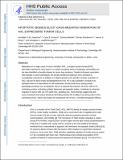Apoptotic Bodies Elicit Gas6-Mediated Migration of AXL-Expressing Tumor Cells
Author(s)
French, Cory B.; Zweemer, Jacomina M.; Mesfin, Joshua; Gordonov, Simon; Meyer, Aaron Samuel; Lauffenburger, Douglas A; ... Show more Show less
Downloadnihms965901.pdf (946.9Kb)
OPEN_ACCESS_POLICY
Open Access Policy
Creative Commons Attribution-Noncommercial-Share Alike
Terms of use
Metadata
Show full item recordAbstract
Metastases are a major cause of cancer mortality. AXL, a receptor tyrosine kinase aberrantly expressed in many tumors, is a potent oncogenic driver of metastatic cell motility and has been identified as broadly relevant in cancer drug resistance. Despite its frequent association with changes in cancer phenotypes, the precise mechanism leading to AXL activation is incompletely understood. In addition to its ligand growth arrest specific-6 (Gas6), activation of AXL requires the lipid moiety phosphatidylserine (PS). Phosphatidylserine is only available to mediate AXL activation when it is externalized on cell membranes, an event that occurs during certain physiologic processes such as apoptosis. Here, it is reported that exposure of cancer cells to phosphatidylserine-containing vesicles, including synthetic liposomes and apoptotic bodies, contributes to enhanced migration of tumor cells via a PS-Gas6-AXL signaling axis. These findings suggest that anticancer treatments that induce fractional cell killing enhance the motility of surviving cells in AXL-expressing tumors, which may explain the widespread role of AXL in limiting therapeutic efficacy. Implications: This study demonstrates that motility behavior of AXL-expressing tumor cells can be elicited by Gas6-bearing apoptotic bodies generated from tumor treatment with therapeutics that produce killing of a portion of the tumor cells present but not all, hence generating potentially problematic invasive and metastatic behavior of the surviving tumor cells.
Date issued
2017-09Department
Massachusetts Institute of Technology. Department of Biological Engineering; Koch Institute for Integrative Cancer Research at MITJournal
Molecular Cancer Research
Publisher
American Association for Cancer Research (AACR)
Citation
Zweemer, Annelien J.M. et al. “Apoptotic Bodies Elicit Gas6-Mediated Migration of AXL-Expressing Tumor Cells.” Molecular Cancer Research 15, 12 (September 2017): 1656–1666 © 2017 American Association for Cancer Research
Version: Author's final manuscript
ISSN
1541-7786
1557-3125